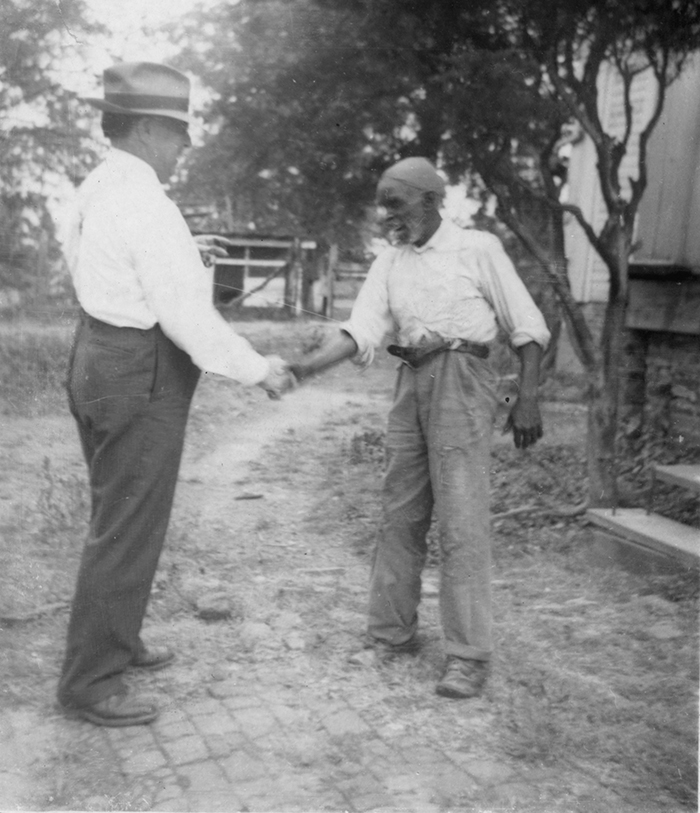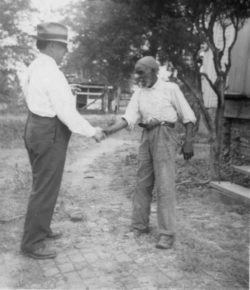John Lomax
John Avery Lomax was a folklorist and musicologist who, with his son Alan Lomax, made the first recording of the Louisiana blues guitarist Huddie Ledbetter (Lead Belly) at the Louisiana State Penitentiary at Angola.

Courtesy of Library of Congress Prints and Photographs Division
Uncle Rich Brown and John A. Lomax. Lomax, Ruby T. (Photographer)
John Avery Lomax was an American folklorist, musicologist, and professor. As an early field recorder of rural American music, he collected more than 10,000 recorded and transcribed cowboy songs, reels, work songs, ballads, and blues for the Archive of American Folk Song at the Library of Congress. With his son, the folklorist Alan Lomax, he made the first recording of the Louisiana blues guitarist Huddie Ledbetter (Lead Belly) at the Louisiana State Penitentiary at Angola.
Education and Childhood
John Lomax was born in Mississippi on September 23, 1867, and was raised in rural Bosque County, Texas, on a farm close to a branch of the old Chisholm Trail. From childhood, he had an interest in the cowboy songs sung on the Texas frontier, and he made a hobby of writing down the lyrics and music. Although, like many children in rural post–Civil War Texas, the young Lomax often missed school in order to work the family farm, his father was a staunch supporter of education and saw to it that his children attended school as much as possible. Lomax learned enough to teach in country schools as a young man and arrived at the University of Texas in 1895 to study English literature; in his 1947 book Adventures of a Ballad Hunter, he remembers showing his collection of cowboy songs to a professor only to have it rebuffed as unworthy of serious study. He recounts taking the sheaf of papers behind a dormitory and burning them.
Early Research and Academic Career
After teaching English at Texas A&M University for four years, Lomax began graduate study in English at Harvard in 1907. There, he studied with professors Barrett Wendell and George Lyman Kittredge, and his interest in folk music enjoyed a better reception. In 1908 he returned to Texas A&M with a master’s degree and—with the help of those two scholars—got a grant to research and collect cowboy songs. That fieldwork resulted in his first book, the popular 1910 anthology Cowboy Songs and Other Frontier Ballads. Notably, one of the songs he had collected and included in it was “Home on the Range.”
Also in 1910 Lomax cofounded the Texas branch of the American Folklore Society and took an administrative job at the University of Texas. He continued his research until 1917, when he and six other faculty members were fired after a political battle between the governor of Texas, James Ferguson, and the university president. Lomax was offered his position back the same year, after Ferguson was impeached, but did not take it. He remained in Chicago, Illinois, where he had moved and taken a job as a banker, until 1932, continuing his research into Texas music and folklore via correspondence.
The Library of Congress and Lead Belly
After his first wife, Bess Brown Lomax, died in 1931, Lomax traveled and lectured throughout the country. While visiting New York City in 1932, he pitched and sold the idea of a complete anthology of American folk music to the MacMillan publishing house. It was in the course of research for that work that he developed the relationship with the Library of Congress’s Archive of American Folk Song that would result in his greatest legacy.
With the library’s equipment and his eighteen-year-old son, Alan, he traveled by car throughout Texas and Louisiana, making acetate disc, Dictaphone, and wax cylinder recordings of prisoners, cowboys, French-speaking Cajuns, and Spanish-speaking vaqueros singing traditional and rural songs.
It was in the summer of 1932 that John and Alan visited the Louisiana State Penitentiary at Angola and met the guitarist Huddie “Lead Belly” Ledbetter. Lomax was so impressed by the convicted murderer’s songs that he deliberated trying to speed Ledbetter’s release from prison. A year later he returned to Angola and recorded a song that Lead Belly had written; it was a plea for pardon. Lomax sent the song to Louisiana governor O. K. Allen. A month later, Ledbetter was paroled, though not because of the song; he had simply acquired enough “good time” in prison to become eligible for release.
Lomax’s association with Lead Belly lasted several years; the two traveled together in the South and to New York and Boston, Massachusetts, recording, speaking, and performing together. The relationship has been criticized for Lomax’s perceived exploitation of Lead Belly. In 1935 the guitarist sued Lomax over royalties from his songs and a film segment that had been recorded the year before, as well as a dispute over his management contract. Later on, Alan Lomax, who had become a significant folk-song collector and promoter in his own right, would continue to work with Lead Belly.
Lomax became the honorary curator of the Archive of American Folk Song, and he continued to gather field recordings into the early 1940s. He also became folklore editor of the Federal Writers’ Project of the Works Progress Administration and helped gather oral histories from former slaves for that project.
